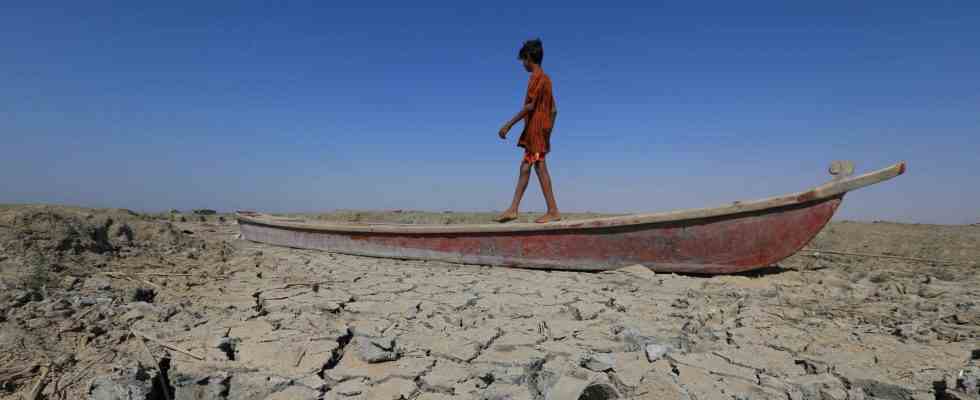world mirror
Status: 03/12/2023 02:03 am
The fertile marshlands of southern Iraq could soon turn into desert. It’s the worst drought in decades. The way of life of the swamp dwellers would then be over.
As the sun rises, the water buffalo start moving. Abu Jassim drives more than 50 animals towards the water with a wooden stick because it is cooler there. It is important to Abu Jassim, a thin man with a thick black beard, that his water buffalos are doing well.
He lives from cattle breeding, the buffalo milk is the only source of income for his family. He lives with his wife Umm Jassim and their children in southern Iraq in a huge swamp area, the marshland near Basra.
But the habitat of humans and animals is threatened, the swamps are losing water. “In November it was still where I’m at right now,” says Abu Jassim, pointing to the dried-up ground. Last year it only rained twice.
The area is losing water every month, he says. Above all, he feels with his animals. “In a few weeks the buffalo will give birth to their young. Then there may be no more water. Calves still drink more than the older buffalo.” He has little hope, says Abu Jassim.
Climate change has also put the world of people in Iraqi swamps at risk.
Ranin Sina, ARD Cairo, Weltspiegel 6:30 p.m., March 12, 2023
Only a quarter of the fish catch
For millennia, people in the Iraqi marshland have lived in harmony with nature, among the reed beds, with hundreds of bird species and water buffalo. It is also called the Venice of the Middle East. Here the rivers Euphrates and Tigris flow together. If you don’t own buffalo, you catch fish.
Azad Abboud, in his mid-50s, used to barter them for other groceries at the local market. But now his net is often empty, there are only a few mullets left. “We used to get up to 100 kilograms out, now we can barely manage 25 kilograms, and only with great effort. But where should we go? Our life is here. The life of our ancestors was already here.”
Gloomy prognosis
A UNESCO World Heritage site dries up. Local environmentalists like Raad Habib al-Asadi measure the condition of the soil and monitor the water levels on a weekly basis. Al-Asadi points to his notebook and says the numbers are alarming. They are used to high temperatures of around 50 degrees in summer, but there hasn’t been a drought like this for 40 years, al-Asadi analyses.
His prognosis is bleak. He fears that the marshland will soon turn into a desert. “It’s climate change. Hardly any rain, plus the rising temperatures. The marshland is getting the full effect of the greenhouse effect.”
Not only the quantity, but also the quality of the water decreases. It’s dirty. Iraqis across the country dump five million cubic meters of sewage into the Tigris tributaries every day. That causes illness. In addition, the salt content in the swamps has increased due to the drought, which in turn harms the buffaloes. The people in this poorer region cannot afford desalination plants.
For thousands of years people have lived in the Iraqi marshes, where the Euphrates and Tigris meet, with their water buffaloes.
Image: AP
“Our culture is dying”
More government help is needed from Baghdad, local leaders unanimously agreed. Every evening, the men of the Beni Assad tribe meet in a mudhif, a traditional communal room made entirely of reeds. 30 or 40 men are sitting on carpets, playing with their prayer beads and discussing the difficulties of the congregation over a cup of Arabic coffee. They are of the Shiite faith, and photos of clergymen hang on the wall.
The older ones are reminiscent of earlier times. The Sunni ruler Saddam Hussein once had dams built to drain the swamps. In his eyes, the marshland was just a retreat for insurgents. Today, other powers are causing concern.
“Turkey is blocking the flow of water to us and building the dams,” Basher al-Batan complains. His neighbor, Mustafa Saeed, explains: “We, the younger generation, are very worried. If the marshland dries up, our culture will also die out.”
Mudhifs are traditional communal spaces built entirely of reeds.
Image: AFP
Work otherwise only in the oil industry
Abu Jassim is also afraid of that, especially of moving. He loves life on the water, sitting on a narrow boat, cigarette in hand and smiling. With his eldest son he sold buffalo milk on the mainland and bought feed for the animals. Now they are on their way home. The son would like to continue the tradition of his parents, but carrying fresh water and food every time is tedious, but above all expensive.
The family cannot afford this in the long run. “Not just me, everyone will go. Maybe you won’t find anyone here soon,” Abu Yassim calls out to his eldest. Your only chance of getting a job in the region would then be further down the river: the oil industry. A whole different world for the people of the swamps.
You can see the report on the subject in Weltspiegel – on Sunday at 6:30 p.m. in the first.

